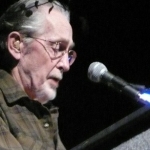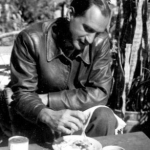[FOR WARREN WINSLOW, DEAD AT SEA]
Let man have dominion over the fishes of the sea and the fowls of the air and the beasts of the whole earth, and every creeping creature that moveth upon the earth.
I
A brackish reach of shoal off Madaket—
The sea was still breaking violently and night
Had steamed into our North Atlantic Fleet,
When the drowned sailor clutched the drag-net. Light
Flashed from his matted head and marble feet,
He grappled at the net
With the coiled, hurdling muscles of his thighs:
The corpse was bloodless, a botch of reds and whites,
Its open, staring eyes
Were lustreless dead-lights
Or cabin-windows on a stranded hulk
Heavy with sand. We weight the body, close
Its eyes and heave it seaward whence it came,
Where the heel-headed dogfish barks its nose
On Ahab’s void and forehead; and the name
Is blocked in yellow chalk.
Sailors, who pitch this portent at the sea
Where dreadnaughts shall confess
Its hell-bent deity,
When you are powerless
To sand-bag this Atlantic bulwark, faced
By the earth-shaker, green, unwearied, chaste
In his steel scales: ask for no Orphean lute
To pluck life back. The guns of the steeled fleet
Recoil and then repeat
The hoarse salute.
II
Whenever winds are moving and their breath
Heaves at the roped-in bulwarks of this pier,
The terns and sea-gulls tremble at your death
In these home waters. Sailor, can you hear
The Pequod’s sea wings, beating landward, fall
Headlong and break on our Atlantic wall
Off ’Sconset, where the yawing S-boats splash
The bellbuoy, with ballooning spinnakers,
As the entangled, screeching mainsheet clears
The blocks: off Madaket, where lubbers lash
The heavy surf and throw their long lead squids
For blue-fish? Sea-gulls blink their heavy lids
Seaward. The winds’ wings beat upon the stones,
Cousin, and scream for you and the claws rush
At the sea’s throat and wring it in the slush
Of this old Quaker graveyard where the bones
Cry out in the long night for the hurt beast
Bobbing by Ahab’s whaleboats in the East.
III
All you recovered from Poseidon died
With you, my cousin, and the harrowed brine
Is fruitless on the blue beard of the god,
Stretching beyond us to the castles in Spain,
Nantucket’s westward haven. To Cape Cod
Guns, cradled on the tide,
Blast the eelgrass about a waterclock
Of bilge and backwash, roil the salt and sand
Lashing earth’s scaffold, rock
Our warships in the hand
Of the great God, where time’s contrition blues
Whatever it was these Quaker sailors lost
In the mad scramble of their lives. They died
When time was open-eyed,
Wooden and childish; only bones abide
There, in the nowhere, where their boats were tossed
Sky-high, where mariners had fabled news
Of IS, the whited monster. What it cost
Them is their secret. In the sperm-whale’s slick
I see the Quakers drown and hear their cry:
“If God himself had not been on our side,
If God himself had not been on our side,
When the Atlantic rose against us, why,
Then it had swallowed us up quick.”
IV
This is the end of the whaleroad and the whale
Who spewed Nantucket bones on the thrashed swell
And stirred the troubled waters to whirlpools
To send the Pequod packing off to hell:
This is the end of them, three-quarters fools,
Snatching at straws to sail
Seaward and seaward on the turntail whale,
Clamavimus, O depths. Let the sea-gulls wail
For water, for the deep where the high tide
Mutters to its hurt self, mutters and ebbs.
Waves wallow in their wash, go out and out,
Leave only the death-rattle of the crabs,
The beach increasing, its enormous snout
Sucking the ocean’s side.
This is the end of running on the waves;
We are poured out like water. Who will dance
The mast-lashed master of Leviathans
Up from this field of Quakers in their unstoned graves?
V
When the whale’s viscera go and the roll
Of its corruption overruns this world
Beyond tree-swept Nantucket and Woods Hole
And Martha’s Vineyard, Sailor, will your sword
Whistle and fall and sink into the fat?
In the great ash-pit of Jehoshaphat
The bones cry for the blood of the white whale,
The fat flukes arch and whack about its ears,
The death-lance churns into the sanctuary, tears
The gun-blue swingle, heaving like a flail,
And hacks the coiling life out: it works and drags
And rips the sperm-whale’s midriff into rags,
Sailor, and gulls go round the stoven timbers
Where the morning stars sing out together
And thunder shakes the white surf and dismembers
The red flag hammered in the mast-head. Hide
Our steel, Jonas Messias, in Thy side.
VI
OUR LADY OF WALSINGHAM
There once the penitents took off their shoes
And then walked barefoot the remaining mile;
And the small trees, a stream and hedgerows file
Slowly along the munching english lane,
Like cows to the old shrine, until you lose
Track of your dragging pain.
The stream flows down under the druid tree,
Shiloah’s whirlpools gurgle and make glad
The castle of God. Sailor, you were glad
And whistled Sion by that stream. But see:
Our Lady, too small for her canopy,
Sits near the altar. There’s no comeliness
At all or charm in that expressionless
Face with its heavy eyelids. As before,
This face, for centuries a memory,
Non est species, neque decor,
Expressionless, expresses God: it goes
Past castled Sion. She knows what God knows,
Not Calvary’s Cross nor crib at Bethlehem
Now, and the world shall come to Walsingham.
VII
The empty winds are creaking and the oak
Splatters and splatters on the cenotaph,
The boughs are trembling and a gaff
Bobs on the untimely stroke
Of the greased wash exploding on a shoal-bell
In the old mouth of the Atlantic. It’s well;
Atlantic, you are fouled with the blue sailors,
Sea-monsters, upward angel, downward fish:
Unmarried and corroding, spare of flesh
Mart once of supercilious, wing’d clippers,
Atlantic, where your bell-trap guts its spoil
You could cut the brackish winds with a knife
Here in Nantucket, and cast up the time
When the Lord God formed man from the sea’s slime
And breathed into his face the breath of life,
And blue-lung’d combers lumbered to the kill.
The Lord survives the rainbow of His will.

















Comment form: